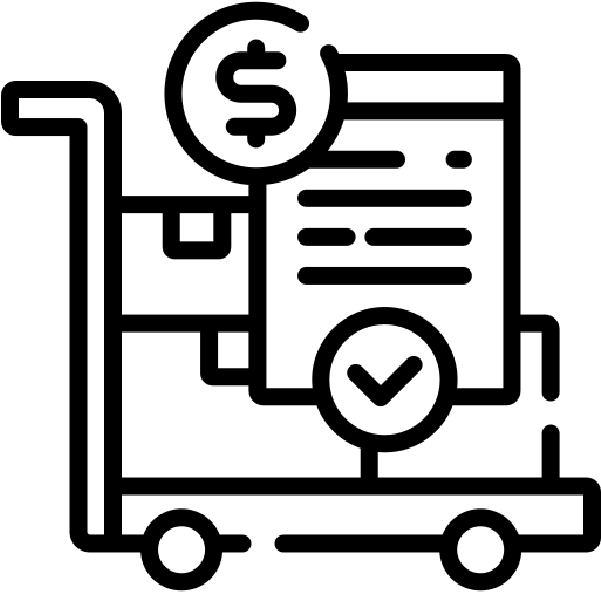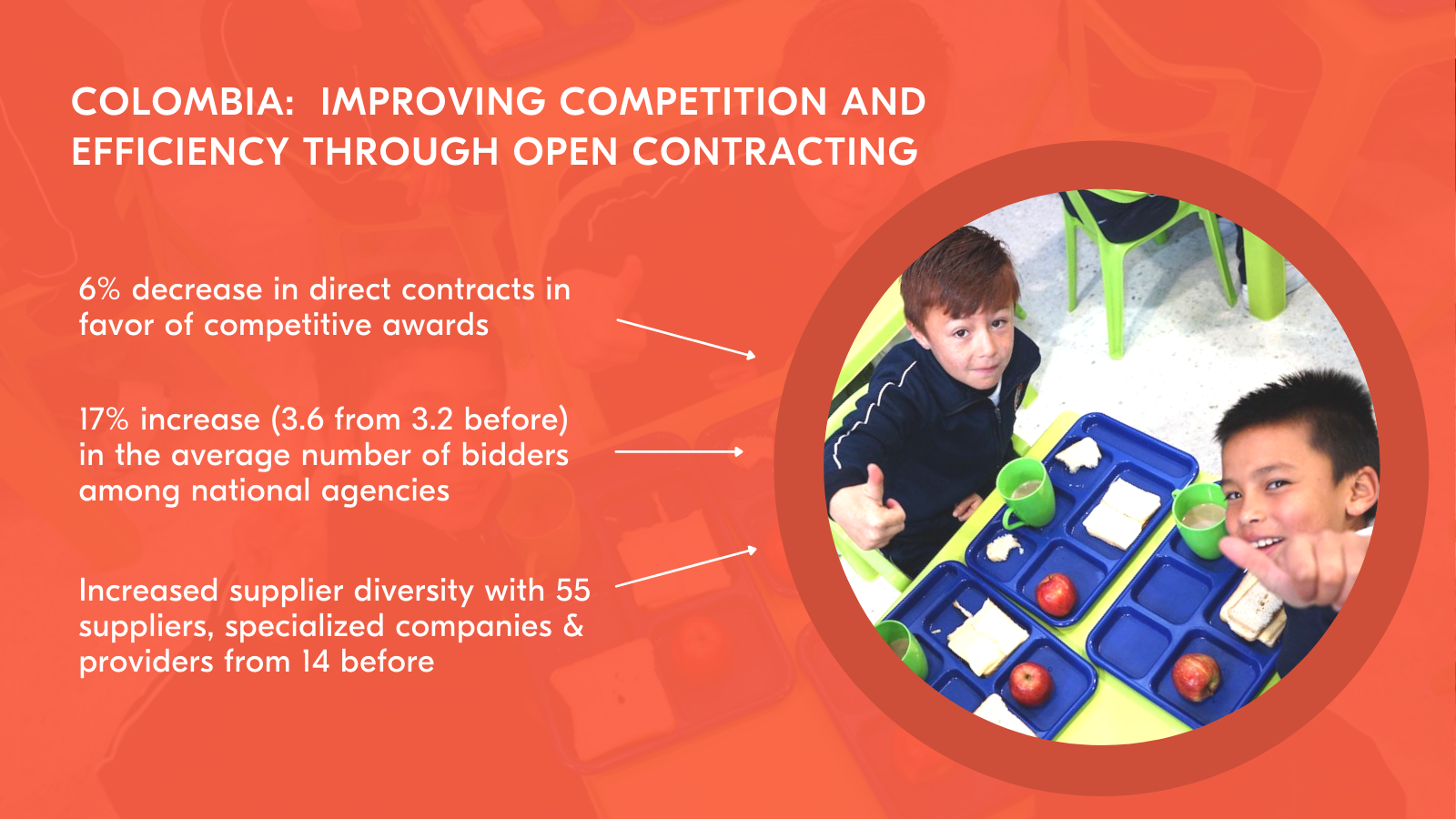Colombia:
Improving competition and efficiency through open contracting
Colombia implemented open contracting reforms and publishing open data to improve efficiency in its public procurement and help reduce corruption. The data shows that the reforms are working: there is improved competition with more diverse suppliers. Regions with open contracting saw a 46% higher average number of bidders and a 64% higher value awarded through open procedures, increasing opportunities for SMEs. Targeted open contracting strategies empowered small women-led producers to provide school meals for students. Bogota’s daily school meals program now runs more efficiently, after breaking a US$22 million price-fixing scheme. Open data on the COVID-19 emergency response spending enabled society, journalists, and other interested stakeholders to monitor in real-time and a new dashboard will further enable civic monitoring of procurement performance.
Key open contracting strategies
 |
 |
 |
 |
 |
| Developing a new central open contracting e-procurement platform | Collaboration with key stakeholders to improve procedures in public works | Applying open contracting strategies to critical public services such as school meals | Empowering civil society and journalists to monitor public procurement | Timely monitoring to maintain efficiency and value for money even during a crisis |
Summary
- Challenge: In Colombia, like in many countries, low levels of competition in public procurement are common. This makes government spending vulnerable to inefficiency and corruption. Local governments are the largest buyers of goods and services in Colombia. Each year, over 700,000 procurement processes, or 70% of public contracting, happens at the municipal and departmental level.
- Open contracting approach: An open and standardized approach to procurement introduced in 2015 is changing that. Streamlined processes and open data used to engage with civil society and vendors increased competition. Driven by high-profile graft scandals and a popular vote against corruption, a public, fast and accurate monitoring system has created incentives for procuring entities to make contracts more competitive. A new dashboard enables greater civic monitoring of procurement performance, including tracking new regulations to measure and enable the participation of women-owned businesses. During the pandemic, a single open framework and real-time open data helped coordinate the pandemic response and allowed civil society, journalists, and academics to track and fix emergency contracts gone wrong.Under a project financed by the UK Prosperity Programme between 2018-2023, OCP worked in nine regions of Colombia to accelerate digital transformation, advance data-driven decision-making, implement gender-responsive procurement, and promote civic oversight of public procurement through hands-on technical assistance in open contracting strategies.
- Results: The data shows this is working: entities using competitive procurement methods show improved competition and more diverse suppliers. Tenders have 17% more bidders on average. Standard bidding documents and contracts save everyone’s time. Regions supported through a dedicated open contracting reform program saw a 46% higher average number of bidders and a 64% higher value awarded through open procedures, increasing opportunities for SMEs. The adoption of the country’s transactional electronic procurement system jumped from 15% to 94.5%. In other regions, adoption was 23% in 2022 up from 8.8% in 2018. But open contracting has not only improved opportunities for businesses, it has also had a direct impact on students in Bogota’s schools. The education department and the national public procurement agency used open contracting data to ensure 900,000 high-quality meals for school children each day and break up a US$22 million price-fixing scheme. The number of suppliers for meals increased from 12 to 55, improving efficiency and reducing costs while maintaining quality. In Palmira, more than 200 local farmers – many of them women-owned businesses – are able to sell their produce to the municipality for the first time.Improving the stability of the API to access open contracting data and a faster roll-out to the higher quality SECOP II system will provide even more benefits.
“Having a broader supplier base when responding to the coronavirus emergency meant we had more information on prices, quality and supply alternatives in a market with wide distortions, information asymmetries, demand pressures, and the rupturing of international supply chains.”
“Public data is here to stay.”
“We set out radical reforms based on an open contracting approach. We established minimum and maximum prices for meals and we made the whole contracting process competitive and fully open, because our children need healthy food to thrive, and governments need transparency and integrity so that taxpayers’ money is spent wisely and truly benefits citizens. The multi-billion-dollar world of public contracting urgently needs a revolution, not only in Bogota’s School Feeding program but in every public contracting process: integrity and transparency must lead public management.”
At a glance

The key data
| Impact after the reforms | ||
| Competition | ||
| Direct contracts | Decrease of 6% in direct contracts in favor of competitive awards in 2021 | |
| Average number of bidders | 17% increase in the average number of bidders among national agencies in 2021 | |
| Regional development bank Infocaldas has nearly tripled participation (from 40 to 114) and increased its number of suppliers by four (from 8 to 34) in 2021 | ||
| School meal program (Bogota) | ||
| In specific programs, such as Bogota’s school meal program, supplier diversity increased after implementing open contracting. | From 14 suppliers, multipurpose companies to 55 suppliers, specialized companies & providers | |
| Municipal open contracting reform project (9 regions) |
||
| Adoption of the country’s transactional e-procuremenet system (SECOP II) | From 15% in 2018 to 94.5% in 2022 in regions participating in the open contracting project. In other regions of the country, adoption was 23% in 2022 up from 8.8% in 2018. | |
| Increase in competition | The value awarded through open processes went from 50% to 65% of total procurement spending between 2018-2022. Target regions were awarding 64% more of their procurement spending through open processes than the rest of the country and the average number of bidders was 46% higher. |
Read all stories
Colombia has been implementing open contracting reforms since 2014. Read all stories.